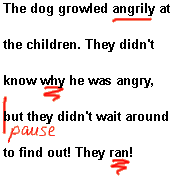"Writing for the Ear" means writing words that people will hear with their ears, not read with their eyes. Like when people write scripts for radio or TV. Or when YOU write an oral presentation to read in class.
When you write for the ear, you must remember one important fact: Listeners don't get a second chance! READERS who don't understand something can go back and read it again. LISTENERS can't. Listeners must understand your words the first time, or they're gone forever into the air!
So, when you write for the ear (for oral presentation), use these 8 tips.TIP #1. WRITE LIKE YOU TALK.
Well, almost like you talk. No swearing, please. But listen to announcers and news people on radio and TV and you'll notice something: the best ones sound like they're just TALKING to you, not READING to you. So if you write something that "sounds" like you're reading it when you say it aloud - then it's wrong. For example, read aloud the two sentences to the right.
Which one sounds more like people talk?
Yesterday, following a luncheon, the Mayor delivered an address to the student body.
The Mayor talked to the students yesterday after lunch.
TIP #2. KEEP SENTENCES SHORT.
It's better to write two simple sentences than one long, complicated sentence. It's hard for listeners to recall at the end of a long sentence what you said at the beginning. And remember: they can't go back and re-read the sentence. To the right is a sentence that's too long for the ear. Then it's followed by a better way to write the same information for a listener by making it into 4 short sentences.
My grandmother, who came to America when she was a little girl, told me yesterday that she still remembers the first time she saw the Statue of Liberty, which she said made her cry, but I'm not sure why.
My grandmother came to America when she was a little girl. Yesterday she told me she still remembers the first time she saw the Statue of Liberty. She said it made her cry. But I'm not sure why.
TIP #3. DON'T USE BIG WORDS WHEN SMALL ONES WILL DO.
It's good to keep learning new words and developing your vocabulary. But it's clearer for listeners if you use simple words rather than big ones. For example, look again at the example in TIP #1. It sounds better to say the Mayor "talked to" the students than the Mayor "delivered an address to" the students. Simpler is better.
To the right are two more examples of how to make something simpler by using smaller words.
Cathy declared she really liked chocolate. Cathy "said" she really liked chocolate works just as well as the big word "declared."
Gene attempted to purchase a new camera. "Attempted to purchase" uses big words. It's simpler to say he "tried to buy" a new camera.
TIP #4. USE CONTRACTIONS.
The way people talk is filled with contractions like those to the right.
Contractions sound like people talk. So don't be afraid to use them when writing for the ear.
I've is a contraction for I have.
It's is a contraction for it is.
We'll is a contraction for we will.
TIP #5 USE ACTIVE VERBS.
In the English language, there are "active" verbs and "passive" verbs. Active verbs are better for listeners. They are clearer, more direct, and easier to understand. For example, to the right is a sentence with a passive verb, "was hit."Who did the action? The car. What did it do? It hit. Who did it hit? The boy. So it would be much easier for a listener to understand if you just said it more directly. Like the sentence to the right. It's short and direct.
"Hit" is an active verb.
TIP #6. WATCH OUT FOR "SOUNDALIKES".
These are words that readers can SEE are different, but listeners might be confused. For example, read aloud the sentence at right.
How would a listener know if the last word was "two" or "too?" Be careful of "soundalikes" or your writing might look good on the page, but sound wrong on the radio.
Yesterday the Yankees won their game and the Mets won two.
TIP #7. READ YOUR WORDS ALOUD.
That's the only way to hear how your words sound. When you read aloud you can hear problems that your eye doesn't notice, like sentences that are too long, or tongue-twisters like the one to the right.
An even better idea is to tape record yourself to hear how you sound.
Remember, what you LOOK LIKE on the radio is not important. How you SOUND is!
Sarah sold her seashells slowly Saturday.
TIP #8 MARK UP YOUR SCRIPT.
What script? Whatever you write to read aloud is a script. And here's an idea to help you practice reading your script. In every sentence you write, there are some words you want to emphasize by saying them louder or with more energy. Professional announcers and news reporters underline those words so they'll remember. And they make other marks on the script to remember where they want to pause, or where they might need to take a breath.
Try "marking up" your writing too. It'll help you remember how you want to sound when you read aloud.

TEACHERS ONLY
